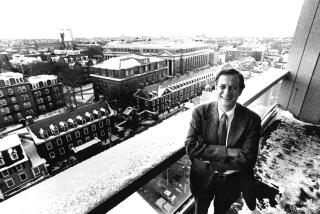A Golden Age Gleams Anew in ‘Komediant’
- Share via
Arnon Goldfinger’s emotion-charged documentary “The Komediant” manages to be succinct yet comprehensive, a bittersweet saga about the performing Burstein family and a chronicle of the golden age of the Yiddish theater. It abounds in the humor and wisdom of its participants, which include such stalwarts of the Yiddish theater as Fyvush Finkel and Shifra Lerer. The range of its unique film clips is astonishing.
The patriarch of the family, Pesach’ke Burstein (1896-1986), was born in Warsaw. Raised in Berdiansk, Russia, he ran away from home at 15 to join a traveling Yiddish theatrical troupe, never again to see his parents, who were subsequently killed in a pogrom. By 1924 Burstein had made such a name for himself that Bores Tomashefsky, a legendary pioneer of the Yiddish theater in America, brought him to New York. In addition to acting, Burstein was a debonair song-and-dance man in the manner of Maurice Chevalier, and he had a special gift: whistling. He even recorded his friend Al Jolson’s “Sonny Boy” in Yiddish the same day, in the same studio and with the same orchestra that Jolson had just used.
Burstein soon became an international star of the Yiddish theater. In the late ‘30s he met the vivacious blond performer Lillian Lux, who at 16 was 22 years his junior. They soon married, entering into an enduring personal and professional partnership. (No sooner had the couple boarded the last ship out of Poland, where they had been engaged for the 1939-’40 season in Warsaw, than Germany invaded.) When the Bursteins’ twins, Mike and Susan, turned 7, they joined the family act. In the postwar years the Bursteins toured constantly, traveling almost everywhere there was a Yiddish-speaking community. (The film gets its title from a popular play the family performed in during that time.)
As close-knit as the family was, Susan wanted out by the time she reached her teens, and at 18 married a man 15 years her senior. The marriage was a success, and Susan got the conventional home life she craved so badly. Eager to establish his own identity beyond the dwindling world of the Yiddish theater, Mike soon followed Susan in striking out on his own, establishing an international acting and singing career that not only brought him major stardom in Israel but even found him playing the title role in “Barnum” on Broadway.
Clearly, the children’s determination to pursue their own lives and careers placed a great strain on their parents, who were soon to discover that in the dwindling days of the Yiddish theater they could not continue performing their venerable repertoire without the youthful drawing card of their charismatic son.
A sense of irony permeates “The Komediant” in that it is confounding to realize just how famous the Bursteins became in far-flung Yiddish-speaking communities while remaining largely unknown outside it. The film’s fortuitous point of departure is a revival in Israel, to mark the centennial of Pesach’ke’s birth, of the Bursteins’ greatest hit, “A Village Wedding,” starring Mike in his father’s role and playing opposite Lillian. Goldfinger does not make a point of it, but it is impossible to watch this warm, wonderful film without becoming aware of the enormous impact the Yiddish theater has had on every aspect of American show business.
Unrated. Times guidelines: Appropriate for all ages.
‘The Komediant’
A New Yorker Films release. Director Arnon Goldfinger. Producer Amir Harel, with Goldfinger, Oshra Shwartz & Zebra Productions, Inc. Writer Oshra Schwartz. Cinematographer Yoram Millo. Editor Einat Glaser-Zarhin. In English, Yiddish and Hebrew, with English subtitles. Running time: 1 hour, 25 minutes.
Exclusively at the Music Hall, 9036 Wilshire Blvd., Beverly Hills, (310) 274-6869.
More to Read
Only good movies
Get the Indie Focus newsletter, Mark Olsen's weekly guide to the world of cinema.
You may occasionally receive promotional content from the Los Angeles Times.










